“Inequity, Inequality, Insecurity”: special issue of the Review of Economics and Economic Methodology (REEM)
The Review of Economics and Economic Methodology (REEM) is a peer-reviewed, bi-annual  academic journal with a focus on economic theory, economic methodology, economic history and ethics in economics. It is set up and managed by the coordinators of the Movement for Economic Pluralism, School of Economics and Business, University of Ljubljana.
academic journal with a focus on economic theory, economic methodology, economic history and ethics in economics. It is set up and managed by the coordinators of the Movement for Economic Pluralism, School of Economics and Business, University of Ljubljana.
Special issue: Inequity, Inequality, Insecurity
Volume V, Issue 1, January 2021
September 30th, 2020 – deadline of the submission of full papers
There is absolutely no doubt that the homo economicus have set their foot in, or to be more precise returned to, the age of inequality. Massive concentration and centralization of wealth, growing capital-labor antagonism, soaring core-periphery division, expansion of interpersonal inequalities and inequalities of opportunity, restricted inter-class mobility and assortative mating, unequal taxation and across-the-board decline of worker’s living standards, are a few dimensions indicating that inequality has gone awry. There are ample reasons why 2019 can be seen as the year when economic inequality continued to dominate the mainstream theoretical landscape. Besides the deluge in academic writings and public debates, the fact that economic inequality became a matter of general public concern is self-evident once it is acknowledged that the Nobel Prize in Economics was awarded to Banerjee, Duflo, and Kremer, for their experimental approach to poverty. Moreover, the previous laureate, Krugman confessed that the international trade and growth models vastly underestimated the effects on jobs and inequality. Additionally, this year was permeated with numerous works on inequality which can justifiably be labeled as seminal studies. These are, inter alia, Milanović’s “Capitalism Alone”, Piketty’s “Capital and Ideology”, Stilwell’s “Political Economy of Inequality”, Saez and Zuckman’s ”The Triumph of Injustice”, Pistor’s “The Code of Capital”, Cope’s “The Wealth of (Some) Nations”, and Boushey’s “Unbound”. In light of this, it comes as no surprise that our special issue is devoted to the continuation of efforts in raising the awareness of the role that the inequality phenomena has in relation to the “ordinary business of life” and sustainable societal provisioning.
We welcome all contributions within the domain of inequality that question whether the past inequity is the root cause of present-day inequality, and how present-day inequality is determining future insecurity. In addition to the traditional research of outcome and opportunity, a focus will be on work that presents a novel approach to the study of inequality. Accordingly, the editors encourage applications providing an outlook related to the historical development, value theory, property and ownership considerations, environmental issues, social media and technology, and surveillance capitalism. The final objective of this special issue is to furnish a painfully necessary departure from the marginalist narrative which predominantly justifies the excessive inequalities on the grounds of incentives. This volume seeks to investigate the previous shortcomings, analyze the present theoretical frameworks, and propose innovative solutions for tackling the existing, detrimental inequalities. In this sense, the prime concern of this number is to make a case for the pluralist approach to economic inequalities that will confirm and deal with the analytically well-established axiom that extreme inequalities render dysfunctional societies.
All other contributions that are within the journal’s scope, regardless of the main topic of the special issue, and its various interpretations are also welcome. The research domains are:
(1) Economic theory: We welcome contributions from different schools in economics, papers are not discriminated by their paradigmatic content, but by the quality of research.
(2) Economic methodology: We welcome the methodological analysis of concepts, theories and techniques of economics, either mainstream or heterodox.
(3) History of economic thought: We welcome papers that deal with historical development of ideas, concepts, theories and methods in economics.
(4) Ethics and economics: We welcome contributions in philosophy, political science and moral philosophy, in so far as there is some clear link to economics.
All submissions must show a clear connection to economics, but can be non-economical, possibly with a focus on conceptual or methodological issues, and should in some way indicate the link with published research.
Specifications for the submissions under “SUBMISSIONS” tab.
Managing Editors of the Special Issue:
Ivan Rubinić, PhD, Faculty of Law, University of Rijeka, irubinic1@pravri.hr
Petar Milijić, B. A., Faculty of Arts, University of Ljubljana, milijicpetar@gmail.com
Editorial Team
Andrej Srakar, PhD, Editor-in-chief, Institute for Economic Research (IER) and Faculty of Economics, University of Ljubljana, srakara@ier.si
Tej Gonza, MSc, Editor-in-chief, Institute for economic democracy (IED), tej.gonza@ekonomska-demokracija.si
Urban Sušnik, PhD, Editor-in-chief, Faculty of Economics, University of Ljubljana, urban.susnik@outlook.com
Ivan Rubinić, PhD, Editor-in-chief, Faculty of Law, University of Rijeka, irubinic1@pravri.hr
For more information please contact as at reemslovenia@gmail.com
